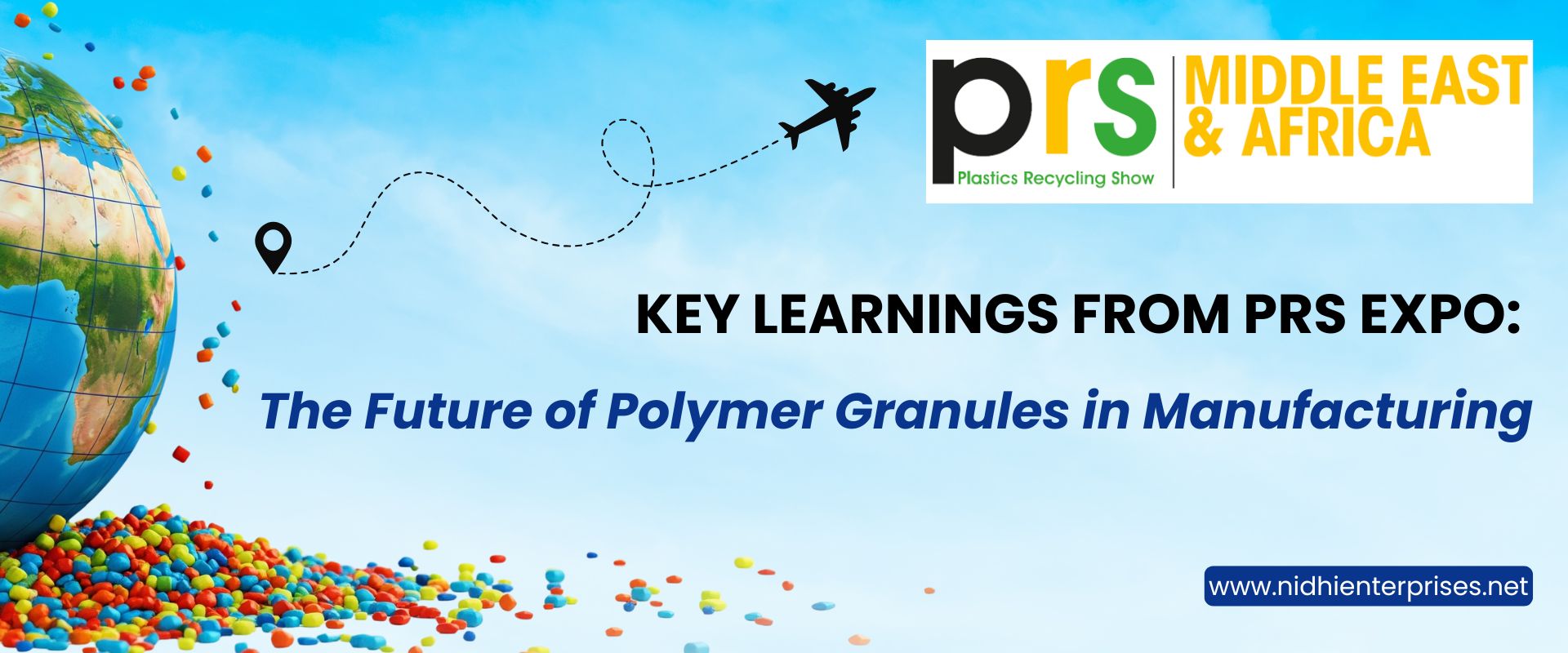
Key Learnings from PRS Expo: The Future of Polymer Granules in Manufacturing
The plastics and polymers industry is undergoing a transformation. With growing demand across packaging, automotive, construction, and consumer goods, polymer granules are at the center of modern manufacturing. At the PRS Expo, where suppliers, buyers, and technology leaders gathered, the future direction of this industry became very clear.
For Nidhi Enterprises, participation at the expo was more than a showcase opportunity — it was an intensive learning experience. Conversations with manufacturers, procurement heads, and business owners revealed critical insights into what the market truly expects from granule suppliers moving forward.
This article highlights the five key learnings from PRS Expo and how they shape the future of polymer granules in manufacturing.
1. The Non-Negotiable Need for Consistency
One of the most dominant themes at the expo was consistency in granule quality. Manufacturers repeatedly emphasized that inconsistent supply leads to huge production challenges:
- Batch-to-batch variation in melt flow index (MFI) or density disrupts machine settings.
- Even a slight deviation in ash content or moisture level can affect finished product durability.
- In high-volume production, downtime caused by inconsistent raw material can lead to losses worth lakhs.
Why consistency matters:
- For ACP sheet producers: uniform granules ensure smooth extrusion and better bonding.
- For packaging industries: consistent polymer properties mean films are stronger, clearer, and defect-free.
- For molding industries: batch variation means increased rejections, wastage, and machine recalibration.
Buyers are no longer willing to “adjust” to quality fluctuations. Instead, they are demanding certified, tested, and stable-quality granules. This shift makes consistency the single biggest competitive advantage for suppliers.
2. Balancing Cost and Performance
Another critical learning from PRS Expo was the rising focus on cost optimization without compromising on performance. With raw material price fluctuations, manufacturers are under pressure to keep costs under control while ensuring product reliability.
Many buyers explained how they evaluate granules not just on price, but on the value they deliver per kilogram. For example:
- A ₹30/kg grade may be suitable for certain applications where high durability isn’t required.
- A ₹40/kg premium grade is justified when end-products demand higher strength, better finish, or compliance with customer specifications.
What this means for suppliers:
- Offering multiple price points is no longer optional — it is expected.
- Suppliers who can provide clear technical data sheets (COAs, MSDS, lab test reports) will gain trust quickly.
- Buyers are open to paying slightly more if they can save on production downtime, wastage, and returns.
The future belongs to suppliers who can help buyers achieve overall cost savings of 8–10% through smarter grade selection and transparency.
3. Customization: The New Industry Standard
In earlier years, bulk buyers were satisfied with standard granule grades. That is changing rapidly. At PRS Expo, there was strong emphasis on customization of granules to match specific end-use requirements.
Examples of customization buyers requested:
- Automotive sector: higher impact resistance and flame-retardant properties.
- Packaging industry: improved flexibility and clarity for thin films.
- Construction materials (ACP, pipes, fittings): better weather resistance and brightness.
The shift in mindset:
- Buyers don’t just want granules; they want granules engineered for their production lines.
- Suppliers must now offer grade variations, blends, and additives to meet these demands.
- The ability to provide tailored solutions will directly influence long-term contracts.
Customization is not just a trend; it is becoming the default expectation.
4. The Urgency of Scale and Speed
The global manufacturing ecosystem is scaling rapidly. Several buyers at PRS Expo highlighted that their biggest frustration is supply not keeping pace with demand.
Why scale matters:
- A buyer producing packaging films may require 200–300 MT per month from a single supplier.
- ACP sheet manufacturers often look for suppliers who can secure 500 MT or more monthly capacity.
- Delays in delivery or partial shipments create bottlenecks that ripple through the supply chain.
Suppliers who can guarantee:
- Large-scale monthly capacity (e.g., 500 MT or more).
- Timely delivery within committed schedules.
- Ability to handle bulk orders without compromising quality …will dominate the market in the coming years.
This is pushing granule manufacturers and traders to invest in larger plants, faster machines, and better logistics networks.
5. Long-Term Partnerships Over One-Time Deals
Perhaps the most strategic takeaway from PRS Expo was that buyers are increasingly looking for partners, not vendors.
In conversations at the stall, many procurement heads shared that they are tired of:
- Suppliers who only focus on price.
- Inconsistent communication.
- Lack of long-term reliability.
What they want instead are suppliers who can:
- Provide transparent pricing and regular updates.
- Commit to timely delivery schedules.
- Work together on cost reduction strategies over time.
This marks a shift from transactional buying to collaborative partnerships. For suppliers, this means customer relationships are no longer about selling one consignment — they are about building 5–10 year sourcing partnerships.
How These Learnings Shape the Future of Granules Manufacturing
From the insights at PRS Expo, it is clear that the future of polymer granules lies in five core principles:
- Consistency in Quality – buyers demand stability.
- Cost-Performance Balance – smart grade selection saves money.
- Customization – tailored granules for different industries.
- Scale & Speed – suppliers must match growing demand.
- Partnership Approach – transparency and reliability win long-term business.
The expo confirmed that suppliers who align with these trends will not just survive but thrive.
Case in Point: Granule Price Differentiation (₹30 vs ₹40/kg)
One of the most interesting discussions at PRS was around granule price brackets. Several buyers wanted clarity on the difference between economical and premium granules.
- At ₹30/kg, buyers expect functional but basic grades — suitable for non-critical products.
- At ₹40/kg, buyers want high consistency, superior finish, and stronger performance.
This means suppliers must:
- Clearly label and market their grades.
- Educate buyers on where each grade adds value.
- Avoid overselling high-priced material where it isn’t needed.
This level of honesty and clarity builds lasting trust.
Conclusion: The Road Ahead
The PRS Expo was more than a networking event; it was a reality check on how quickly the granules industry is evolving. Buyers have become sharper, expectations have increased, and competition among suppliers is intensifying.
The future of polymer granules in manufacturing is defined by:
- Consistency (no quality compromises).
- Efficiency (8–10% cost savings for buyers).
- Customization (granules engineered for application).
- Scale (500 MT/month capacity as a new normal).
- Partnerships (long-term, transparent relationships).
Suppliers who embrace these lessons will set the benchmark for the next decade of polymer granule supply. Those who resist change risk being left behind.
At Nidhi Enterprises, these learnings are already being applied to better serve our customers, ensuring that every kilogram of granules supplied adds real value to their production process.
